- Home
- S. J. Parris
The Academy of Secrets Page 2
The Academy of Secrets Read online
Page 2
Gennaro leaned into the alcove and splashed water over his face and hands, washing off the dust of the road; the silent servant handed him a towel, and he motioned for me to copy him.
‘Where are we?’ I asked, pushing wet hands through my hair. ‘Those statues – they’re pagan, aren’t they? Is this – licit?’
He laughed and clapped me on the shoulder. ‘Since when did you worry about what’s licit, Bruno? Come.’ He moved towards the door.
‘Is the patient through there?’ I had concluded by now that we were in a network of passages and chambers beneath some nobleman’s summer villa, and that we must be there to perform an operation that demanded utmost secrecy. Gennaro had achieved a degree of skill in assisting women with difficult childbirth, though there were still those who felt that midwifery was women’s work and that it was improper for a man to attend a birth, or to interfere if God chose to take the child back before it had even lived. Such niceties would be of no concern to a baron at risk of losing his heir or his lady, but even so, appearances must be preserved. I supposed this to be the reason for our surreptitious arrival.
The servant unlocked the door in the skull’s mouth, and I heard the low murmur of conversation from beyond.
‘Prepare to have your eyes opened,’ Gennaro said. ‘And try not to be flippant.’
Before I could ask what he meant, he stepped through, and I followed.
My first impression of the room beyond was of the chapter house of a wealthy monastery. It was heptagonal in shape, with a high domed ceiling; columns had been built around the walls, and these were carved with inscriptions of numbers and symbols, as if from a book of alchemical formulae. The floor in the centre was made of mosaic tiles, in the design of a great labyrinth. Banks of expensive beeswax candles illuminated the frescoes on the walls, which depicted curious figures I half-recognised from the little I had read of the religions of ancient Egypt and Babylon. But I had no time to take in the paintings, because as soon as the door closed behind us I found eleven pairs of eyes fixed on me.
The chamber was occupied solely by men, seated in a circle on stone benches built into the walls, as if for a meeting. I was the youngest there by at least a decade; most were in their forties or fifties, at a guess, and three were considerably older, to judge by their white hair and beards.
‘Are you bringing children to us now, Gennaro?’ One of the grey-beards spoke, holding out a hand in my direction. ‘What next – a woman?’ A burst of laughter rippled around the group. The tone was good-natured, teasing, but still I bristled; though I did not know yet who these men were, I resented being dismissed for my youth, when I was two years ahead in my studies and could grow a full beard if I chose.
‘So this is the young prodigy.’ One man rose from his seat and crossed the room. He spoke with a quiet authority, and I could see his clothes were expensive. The laughter died away as he approached me. ‘Come here, boy – let me get a better look at you.’
He motioned me to the centre, where a glass lamp hung by a chain from the highest point of the ceiling. In the light he reached up both hands and placed them gently either side of my face. Immediately I knocked his arms away and leapt back, fists raised to defend myself. This caused further mirth among those watching. Let them laugh, I thought; if you are a halfway pretty teenage boy who enters a religious community of men forbidden to touch women, you learn quickly how to fend off the attentions of any older friar who tries to corner you in the bathhouse.
‘Peace, boy,’ the man said, holding up his hands to show he meant no harm. ‘I wish only to read you. Are you not familiar with the science of physiognomy?’
I glanced at Gennaro; he nodded his approval. Against my instincts, I stood beneath the light and let the stranger put his hands to my face again. He closed his eyes as if he were a blind man forming a picture by touch, and I observed him as he pressed his thumbs slowly along my cheekbones, my jaw and the ridge of my brow. His use of ‘boy’ needled me, since he could not have been above fifteen years my senior, though his hair was prematurely receding and he had shaved the rest close so that his high forehead gleamed in the glow of the candles. He stood a couple of inches taller than me, and had the slim, athletic build and graceful movements of one well-practised in the art of fencing. His face was handsome, in an austere way, with a long, straight nose, deep-set eyes and thin lips barely visible through his neat beard. The rest of the gathering appeared to be holding their breath while they awaited his verdict.
Eventually he opened his eyes.
‘A wolf,’ he said. ‘No, not a wolf – a wolfhound. That’s what you are.’
‘Pardon?’ I said.
He laughed. ‘Physiognomonics. Cartography of the human body, if you will. The science of reading character – indeed, predicting it – from the outward physical traits. The universe is made up of signs, as you must know, and the human face is likewise a cipher. Men such as you, for example – dark, lean, with a resemblance to a dangerous animal – are likely to end up in prison, did you know that?’
‘For what – punching people who insult us?’ I said.
The bald man flashed a grin at Gennaro, as if delighted by a new toy. ‘So he’s a wit too,’ he remarked, to his audience, before turning a serious gaze back to me. ‘I thought at first a wolf, but you are more of a tracker than a predator. You put me in mind of a dog that will not give up on its quarry, once he has the scent in his nostrils. What animal would you say I resemble?’ He took a step back to let me look at him.
I was tempted to make some smart comment, but I remembered Gennaro’s warning, and in any case, I was intrigued by his proposition. I considered his face carefully. His eyes were a very light brown, almost tawny; they gave him a feline quality.
‘A lynx,’ I said. It was the first thing that came into my head. There was a sharp intake of breath around the benches.
His eyes widened further, as if I had said something marvellous.
‘Why do you say so?’
‘Because of your eyes. I have the impression that you see what others miss. And the lynx is supposed to be the most sharp-eyed of creatures. Plutarch says it can see through rock. But I don’t believe any of it.’
He gave an indulgent smile. ‘You don’t believe a lynx can see through rock, or that I am sharp-eyed?’
‘I don’t believe that there is any art to read a man’s soul in his face.’
He lifted a brow.
‘Interesting. You don’t agree that a fair appearance denotes nobility of character, and that deformity is a sign of corruption?’
‘Not at all.’
‘Based on what evidence?’
‘My father is a soldier.’ I heard my voice grow heated. ‘His dearest friend, Tommaso, is hideously scarred. Children cry at the sight of him. By your logic, he should be a monstrous, degenerate person. You know how he came by those scars? His garrison was set alight during a campaign, and he dragged his comrades to safety. He went back four times, saving four lives, including my father’s, before he was burned so badly he could no longer stand. It was a miracle he lived at all. So – here is a man so ugly that women cross themselves in the street, who owns more virtue than you or I could ever aspire to.’
‘Ah,’ said the bald man, nodding, ‘but his deformity was due to external causes, he was not born with it. And, tell me – is his character as virtuous as it once was, or has he been made bitter by his change of fortune?’
I hesitated, unwilling to concede the truth of this. ‘Wouldn’t you be?’
‘So you see, then, that it can also work the other way – outward form can affect character. For example, a girl who grows up plain and disregarded and therefore sullen may, on blossoming into womanhood, discover that she is considered beautiful. Being admired instead of ignored might have a transformative effect on her personality – thus beauty can breed generosity and grace. Indeed, I have witnessed this with my own niece. Do you not agree?’
‘I have more often seen beauty breed van
ity and arrogance. I assure you, the most well-favoured young man I ever met in Naples was capable of brutal cruelty, even murder—’ I stopped abruptly; over the man’s shoulder I caught Gennaro’s glare – that murder was a business about which I had sworn to remain silent. ‘Besides,’ I added, ‘you don’t believe your own theories either.’
‘Really? Why do you say that?’ A smile hovered at the edge of his lips.
‘Because you keep a hunchback servant. If you truly thought his deformity denoted a bad character, you would not trust him with welcoming your secret midnight visitors.’
The bald man rubbed his beard and looked around the company, laughing. ‘He has a point. Ercole is the best of men, and worth his weight in gold. You give your opinions very forcefully for one so young,’ he said, clapping me on the shoulder. ‘But I think you were flattering me when you said the lynx. You have read my book, have you not?’
‘I don’t know.’
‘You don’t know if you have read my book?’ He seemed uncertain as to whether I was toying with him.
‘How could I know? I have no idea who you are.’
I had said no more than the truth, but he turned his expression of incredulous amusement on the infirmarian.
‘Gennaro, have you really not told this young man what company you have brought him to?’
Gennaro shrugged, but he was also smiling; I had the sense that the joke was at my expense.
‘I wanted him to arrive without preconceptions,’ he said. ‘Don Giambattista, I present to you Fra Giordano Bruno. Bruno, this is Don Giambattista della Porta, the finest mind in Naples, and her most generous patron of learning.’
Porta effected an elegant bow; there was a hint of mockery in it, though I suspected that was partly directed at himself. I stared at him, amazed.
‘Della Porta – but – you wrote the book on cryptography,’ I blurted. I knew this man by reputation, of course; he was the son of a wealthy nobleman from Vico Equense, further along the coast, and he spent his considerable fortune on the pursuit of scientific enquiry, often – so rumour whispered – far beyond the limit of what was permitted by the Church. It was said that he dabbled in magic. I could hardly believe I was standing in his presence. Suddenly all the Egyptian paintings and alchemical formulae in this underground labyrinth made sense.
‘You’ve read my book on ciphers?’ He looked pleased. ‘How did you get hold of that?’
‘I …’ I faltered. Gennaro had a copy among his secret papers; I was not sure that he knew I’d been sneaking in to read it whenever he was out visiting the sick.
‘No matter. We have heard great things of you, Giordano Bruno. Your master here tells us you are the most promising young theologian San Domenico has seen in a generation.’
‘I thank him for his kindness.’ I dipped my head towards Gennaro. He waved a hand.
‘I’m not being kind, Bruno. It’s the truth. I have told Don Giambattista of your gifts, and he has desired to meet you.’
‘Is this what you want, Bruno?’ Porta asked, fixing me with that clear gaze. ‘To be a theologian? Rise up through the ranks at San Domenico, perhaps become prior some day?’
‘No, sir.’ I did not even have to think about my answer. ‘I could never be prior, I don’t have the right family connections. In any case, theology is too proscribed. I want to study philosophy and cosmology. I wish to understand the universe, and—’ I stopped, afraid of saying too much. San Domenico may have been liberal in its approach to the vows of poverty and chastity, but the Dominican order provided the city’s Inquisitors; we were expected to take our obedience to the Church seriously and could not risk the slightest whiff of heresy ourselves, so I had been obliged to learn how to keep my thoughts private. One careless question could see you denounced. I guessed that this gathering of Porta’s would be far from orthodox, but I needed to guard against saying too much, until I knew better who these men were and whether they could be trusted.
‘To understand the universe. A modest ambition.’ Porta grinned, and surprised me by grasping me in a warm embrace.
‘You are among brothers now, my friend,’ he said, when he released his grip to hold me at arm’s length by the shoulders. ‘We are all of us seeking to understand the universe better. Every man you see here brings a unique gift and perspective to his particular branch of learning. All of us pursue wisdom along paths that have not yet been explored, and which few have the courage to tread. Welcome to the Academy of Secrets.’
This was met with a round of applause and murmurs of welcome from the rest of the gathering. I felt a frisson along my spine, and the hairs on my arms stood up. To be admitted to such company was the most terrifying and exhilarating experience I had had since Gennaro and I anatomised the girl two years earlier.
Porta directed me to a seat. ‘To become a member of the Academy, you must present to us an original thesis or discovery in some area of study, no matter how arcane. We meet here once a month to share our experiments. To give you some idea of the range of our expertise, I will ask my brothers in learning to introduce themselves and their work. I will begin.’
He sat down, and an expectant silence fell.
‘My name is Giambattista della Porta, as you know. I am working on an encyclopaedia of natural magic that will encompass all the hidden properties and correspondences of the material world and the heavens, and teach the adept how to manipulate those properties at will. But I am also conducting research into physiognomy, anatomy, cryptography and memory, among other things. I have built a laboratory and a workshop here in which we carry out practical experimentation.’
He nodded to the man beside him, who announced his name and his field of enquiry – that of optics. He was working with Porta on developing a device that would combine two magnifying lenses in order to see the heavens more clearly. They were some way off a workable prototype, but hopeful of success, and convinced that such an instrument would change the way we were able to measure the stars. I will omit the names of the company, but I was overwhelmed by the breadth of their ambitions to expand human understanding in practical and philosophical directions. There was one who studied hydraulics, another who specialised in the medicinal properties of plants; several whose interests lay in anatomy, in various forbidden forms, including Gennaro, who was intent on unravelling the mysteries of generation; one of the white-haired men claimed to be an adept of the Hebrew Kabbalah, and another had devoted his life to studying the wisdom of the Egyptian sage Hermes Trismegistus. The hairs on my neck stood up as they spoke: questing into the sympathetic properties of plants and crystals may have carried occult overtones, but intimate knowledge of ancient mysticism was unequivocally heretical, highly dangerous, and more seductive to me than any of the pleasures the Cerriglio could offer.
After the introductions, Porta leaned forward in his chair and fixed his lynx-eyes on me.
‘Gennaro tells us you have developed, through your own ingenuity, a memory system that allows you to carry encyclopaedias in your head,’ he said. ‘You will present it to us. But first – some refreshment.’
He picked up a silver bell and rang it; almost immediately the hunchback servant Ercole appeared from the antechamber bearing a tray of glasses in one hand, and a covered iron pot with a spout in the other, from which a curious vegetable smell escaped with the steam. I watched, apprehensive, as he poured a measure of a green liquid into each glass. The members of the Academy sat forward in anticipation; I guessed from their eagerness that this brew was a regular ritual. Porta caught my expression and smiled.
‘You’re afraid we are going to poison you? That you might wake up naked and strapped to an altar?’
I blinked. ‘That had not crossed my mind until you said it. It’s only that I know some plants can produce hypnotic or hallucinogenic effects, and I have never tried—’
‘Indeed, and as we are men of science, I consider it vital that we learn their properties by experimentation. But you need not fear – this infusion will no
t produce visions. It comes from the New World – a contact of mine imports the leaves from Spain. They call it mate de coca. It’s a miraculous brew – it brings mental alertness, aids concentration and staves off fatigue.’
‘Every scholar’s dream,’ I said in wonder, as the glasses were passed around the circle.
‘Apparently it is most potent when the leaves are fresh,’ he said. ‘The natives chew them to suppress the appetite and work longer hours. But to transport the leaves such a distance requires them to be dried, so this tea is the best way of enjoying their benefits. Though I am convinced there must be some means to identify and distil the active ingredients. Something to work on, eh.’

 A Christmas Requiem
A Christmas Requiem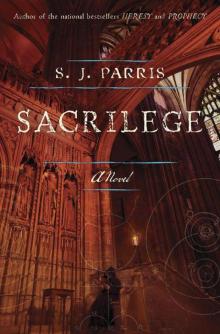 Giordano Bruno 03 - Sacrilege
Giordano Bruno 03 - Sacrilege The Dead of Winter: Three gripping Tudor historical crime thriller novellas from a No. 1 Sunday Times bestselling fiction author
The Dead of Winter: Three gripping Tudor historical crime thriller novellas from a No. 1 Sunday Times bestselling fiction author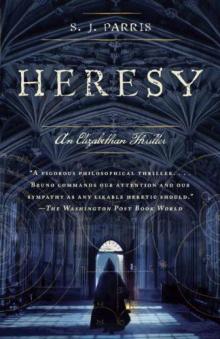 Giordano Bruno 01 - Heresy
Giordano Bruno 01 - Heresy The Dead of Winter
The Dead of Winter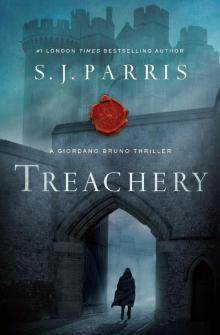 Treachery (2019 Edition)
Treachery (2019 Edition) The Academy of Secrets
The Academy of Secrets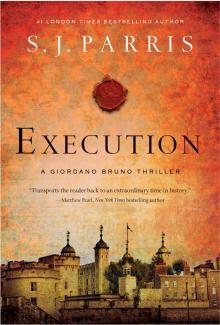 Execution
Execution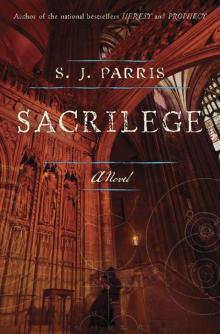 Sacrilege: A Novel
Sacrilege: A Novel Prophecy
Prophecy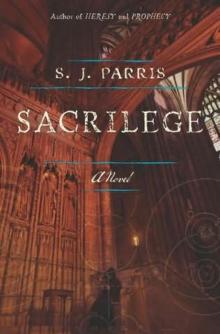 Sacrilege gb-3
Sacrilege gb-3 Prophecy (2011)
Prophecy (2011) Treachery
Treachery Prophecy gb-2
Prophecy gb-2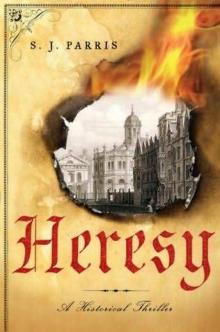 Heresy
Heresy